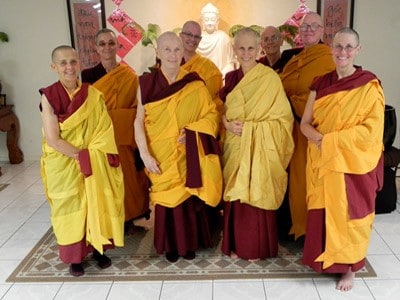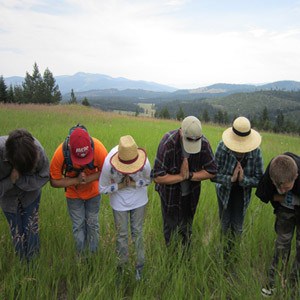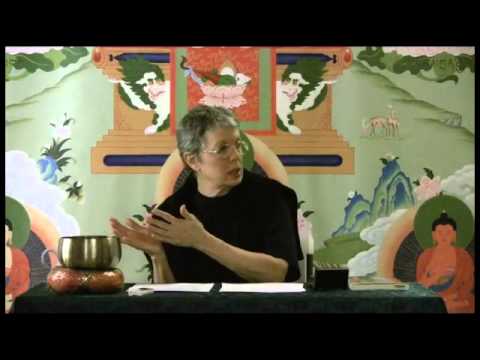Streams of merit
Anguttara Nikaya 8.39

There are, O monastics, eight streams of merit, streams of the wholesome, nourishments of happiness, which are heavenly, ripening in happiness, conducive to heaven, and which lead to whatever is wished for loved and agreeable, to one’s welfare and happiness. What are the eight?
Here, monks, a noble discipline has gone for refuge to the Buddha. This is the first stream of merit, stream of the wholesome, nourishment of happiness, which is heavenly, ripening in happiness, conducive to heaven, and leads to whatever is wished for, loved and agreeable, to one’s welfare and happiness.
Further, a noble disciple has gone for refuge to the Dhamma. This is the second stream of merit, stream of the wholesome, nourishment of happiness, which is heavenly, ripening in happiness, conducive to heaven, and leads to whatever is wished for, loved and agreeable to one’s welfare and happiness.
Further a noble disciple has gone for refuge to the Sangha. This is the third stream of merit, stream of the wholesome, nourishment of happiness, which is heavenly, ripening in happiness, conducive to heaven, and leads to whatever is wished for, loved and agreeable, to one’s welfare and happiness.
There are further, monks, these five gifts—pristine, of long standing, traditional, ancient unadulterated and never before adulterated, which are not being adulterated and which will not be adulterated, not despised by wise ascetics and brahmins. What are these five gifts?
Here, monastics, a noble disciple gives up the destruction of life and abstains from it. By abstaining from the destruction of life, the noble disciple gives to immeasurable beings freedom from fear, freedom from hostility and freedom from oppression. By giving to immeasurable beings freedom from fear, hostility and oppression, he himself will enjoy immeasurable freedom from fear, hostility and oppression. This is the first of those great gifts and the fourth flood of merit.
Further, monastics, a noble disciple gives up the taking of what is not given and abstains from it. By abstaining from taking what is not given, the noble disciple gives to immeasurable beings freedom from fear, freedom from hostility and freedom from oppression. By giving to immeasurable beings freedom from fear, hostility and oppression, she herself will enjoy immeasurable freedom from fear, hostility and oppression. This is the second of those great gifts and the fifth flood of merit.
Further, monastics, a noble disciple gives up unwise and unkind sexual behavior and abstains from it. By abstaining from unwise and unkind sexual behavior, the noble disciple gives to immeasurable beings freedom from fear, freedom from hostility and freedom from oppression. By giving to immeasurable beings freedom from fear, hostility and oppression, he himself will enjoy immeasurable freedom from fear, hostility and oppression. This is the third of those great gifts and the sixth flood of merit.
Further, monastics, a noble disciple gives up false speech and abstains from it. By abstaining from false speech, the noble disciple gives to immeasurable beings freedom from fear, freedom from hostility and freedom from oppression. By giving to immeasurable beings freedom from fear, hostility and oppression, she herself will enjoy immeasurable freedom from fear, hostility and oppression. This is the fourth of those great gifts and the seventh flood of merit.
Further, monastics, a noble disciple gives up wines, liquors, and intoxicants which are the basis for negligence, and abstains from them. By abstaining from wines, liquors, and intoxicants, the noble disciple gives to immeasurable beings freedom from fear, freedom from hostility and freedom from oppression. By giving to immeasurable beings freedom from fear, hostility and oppression, he himself will enjoy immeasurable freedom from fear, hostility and oppression. This is the fifth of those great gifts and the eighth flood of merit.
These, monastics, are the eight streams of merit, streams of wholesome, nourishments of happiness, which are heavenly, ripening in happiness, conducive to heaven, and lead to whatever is wished for, loved and agreeable, to one’s welfare and happiness.
Shakyamuni Buddha
Shakyamuni Buddha is the founder of Buddhism. He is believed to have lived and taught mostly in eastern India sometime between the sixth and fourth centuries BCE. The word Buddha means "awakened one" or "the enlightened one." "Buddha" is also used as a title for the first awakened being in an era. In most Buddhist traditions, Shakyamuni Buddha is regarded as the Supreme Buddha of our age. The Buddha taught a Middle Way between sensual indulgence and the severe asceticism found in the Sramana (renunciation) movement common in his region. He later taught throughout regions of eastern India such as Magadha and Kośala. Shakyamuni is the primary figure in Buddhism, and accounts of his life, discourses, and monastic rules were summarized after his death and memorized by his followers. Various collections of his teachings were passed down by oral tradition and first committed to writing about 400 years later. (Bio and photo by Wikipedia)


